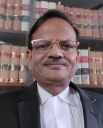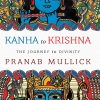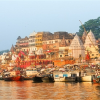Sri Krishna is different from other gods in the Hindu pantheon in that he is not confined to the pedestal but is regarded as family. Mothers see His image in their children while comely maidens seek Him in their lovers. A major part of India’s religion, literature, music, dance, art, culture revolves around the theme of Krishna.
Maybe that is one reason why books have been written trying to explain his supernatural powers and treating him rather as an extraordinarily talented, multifaceted but adorable human being—someone whom we can readily identify with. Bankim Chandra Chattopadhyay did it in his Krishna Charitra and has been followed by innumerable other authors. I have merely attempted to follow their footprints.
I, however, hasten to clarify at the outset that Krishna is as much a part of my existence as anyone else’s and I worship Him as everyone else. The book is only a mythological fiction, intended to be read as a mere story and there is no intent whatsoever to cause any disrespect to anybody’s religious belief.
The theme of the book is that when God takes avatar on Earth, He follows all the laws of nature. Otherwise there would be no necessity for Him to take birth as He could have killed the enemies with a flash of lightning from the sky, so to say. In my humble opinion, God takes avatar to set an example of what we humans can achieve through hard work, intelligence, focus and dedication. We, the lesser beings, being unable to emulate such feats either due to laziness or lack of dedication, take the easy way out and ascribe the feats to supernatural powers.
Applying this theme to the popular story of Krishna’s life, which we have heard since childhood, I tried to build a fiction that gives a realistic and rational explanation of his birth, his leelas and how he achieved his goals. It is a journey of a cowherd boy Kanha to that of Vishnu’s avatar Krishna in which he is forced to toil, encounter caste and colour prejudices, cross obstacles and face betrayals from those he trusted. The transition to avtarhood was aided in no small measure by the politics of the time and the inter se rivalry amongst Kansa’s own advisers. The novel explores what Krishna gained and what he lost in the process of his transition.
In writing this book, I must acknowledge the contribution of my family comprising of my mother Mrs Dolly Mullick, my wife Soma, my daughter Ananya and my son Arnab who not only encouraged my writing but also patiently suffered my absence through the hours I wrote. They are all integral to my very existence and of this book.
The book would not have been the same but for the suggestions given by my great friend Mr C. Mohan Rao, Advocate.
I must thank Google and Wikipedia for facilitating instant research. What would we do without them?
I thank my publisher Readomania and Mr Dipankar Mukherjee for putting their faith in my book and publishing it. My editor Ms Indrani Ganguly did a yeoman’s job in editing it. My special thanks also go to my Literary Agent M/s Book Bakers and Mr Suhail Mathur.
And finally, the question that may dog all readers: Did it actually happen this way as described in this book?
Maybe....
Hare Krishna
PART I - The Birth
It was midnight on the eighth day of the dark phase of moon in the post-monsoon month of Bhadra. Nandrai, the headman of the Gops, paced nervously in front of the delivery room in his cottage. Outside, the wind howled across like a raging wolf, threatening to blow away the roof itself. Trees swayed in the storm and smashed against one another. It seemed as if a war had broken out between the gods and demons. Uprooted trees and branches were hurled like spears across the horizon. Lord Indra lit up the firmament in succession as he hurled thunderbolts towards an invisible foe. Torrential rains in swirling motion, lashed at the doors. From afar, the river Yamuna roared as a caged lion pounding against its barriers, the sound carrying through the howling wind and lashing rain. All over the colony, herds of cows mooed in fright, tugging at their tethers. It was as if the Earth was preparing for another Great Deluge.
Inside the delivery room, the midwife and two other ladies attended to Nandrai’s wife, Yashoda, who was in labour. Nandrai could only helplessly look on as now and again the door opened a bit and one of the ladies hurried out to the kitchen to heat water or get dressings.
A loud clap of thunder shook the whole cottage, followed by the sound of something crashing outside. Was it the cowshed? Nandrai cautiously unbolted the door and immediately the gale prised open the door and forced him back. For a moment, Nandrai was left dazed and by the time he regained his wits, a shower of rain had waltzed inside the room, drenching the floor.
‘What are you doing, Mukhiyaji? Have you lost your senses? For heaven’s sake, a delivery is going on.’ The dai had come out of the delivery room and her professional fury was directed at Nandrai. He might be the mukhiya of the Gops, but here and now she was the one in charge.
Nandrai pushed the door with all his force and barely managed to lock it back. ‘Sorry, Daiji,’ he mumbled. From inside the delivery room, Yashoda shrieked and the dai rushed back into the room.
Each moment seemed like an eternity. The clapping of the sky alternated with Yashoda’s shrieks and the terrified mooing of cattle. It was not a night, but a nightmare.
‘O Lord Indra, please control your fury, please spare us,’ Nandrai prayed fervently in his mind. He could visualise the condition of the village. God knows how many cottages and cowsheds would collapse, how many trees would be uprooted. The cottages and cowsheds could be rebuilt, but God, please protect the people and the animals. A storm of this magnitude would not depart without claiming its sacrifices.
As if in answer to Nandrai’s prayers, little by little, the storm started subsiding. An hour later, as the torrent of rain receded considerably, there was an urgent knock at the door. ‘Mukhiyaji, Mukhiyaji, please open.’
Nandrai hesitantly looked at the delivery room before opening the door. Two villagers stood there.
‘Mukhiyaji, please come. A tree fell on Budhiya’s cottage and he and his wife are injured. We have pulled them out. Please come and see.’ The same instant another villager came rushing in. ‘Mukhiyaji, Bantu and Nandan’s cottages have collapsed. In seven other cottages the roofs have blown off. All their belongings are in a mess.’
So, the ordeal had begun. Nandrai shook off his stupor. ‘I’m coming in a moment. You go and call Vaidji immediately.’ Just then Yashoda shrieked and immediately thereafter one of the attendants came out of the delivery room and proceeded to the kitchen. Nandrai stopped her. ‘Is everything alright?’
‘As of now it is alright, Mukhiyaji. But it is taking time and Yashodaji is getting exhausted.’
For a moment, Nandrai wavered. He was needed as much at home as outside. But he steeled his mind. There was nothing he could presently do at home but to wait. The dai and her attendants were there to take care of Yashoda. But out there in the village, he was the headman and nobody would be able to organise a rescue or give directions in his absence.
‘Alright. Tell Daiji that I am in the immediate neighbourhood. I will keep making rounds of the house from time to time. In case there is any emergency, just send someone to call me.’ Nandrai took a diya, covered it with a plate and went out in the rain.





Comments